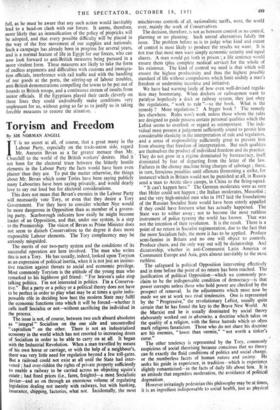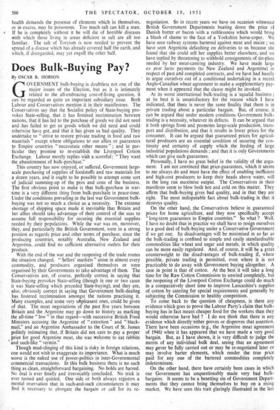Toryism and Freedom
BySIR NORMAN ANGELL
IT is no secret at all, of course, that a great many in the Labour Party, especially on the trade-union side, regard Mr. Aneurin- Bevan as a far greater menace than Mr. Churchill to the world of the British workers' desires. Had it not been for the electoral truce between the bitterly hostile elements in the Labour Party the facts would have been even plainer' than they are. To put the matter otherwise, the things about Mr. Bevan which some Tories have been saying publicly many Labourites have been saying privately, and would dearly love to say out loud but for electoral considerations.
This does not mean that Bevan's enemies in the Labour Party will necessarily vote Tory, or even that they desire a Tory Government. For they have to consider whether Nye would be more dangerous in Opposition than as member of a govern- ing party. Scarborough indicates how easily he might become leader of an OppoSition, and that, under our system, is a step to the Premiership. The vision of Bevan as Prime Minister does not seem to disturb Conservatives to the degree it does more responsible Labour elements. The Tory complacency may be seriously misguided.
The merits of our two-party system and the conditions of its successful operation are here involved. The man who writes this is not a Tory. He has usually, indeed, looked upon Toryism as an expression of political inertia, when it is not just an instinc- tive reaction against threats to social and economic privilege. Most commonly Toryism is the attitude of the young man who remarked to his highbrow girl friend: " For heaven's sake stop talking politics. I'm not interested in politics. I'm a Conserva- tive." But a party or a policy or a political theory does not have to be perfectin order to play what may be at times aquite indis- pensable role in deciding how best the modern State may fulfil the economic functions into which it will be forced—whether it calls itself Socialist or not sacrificing the individual in the process.
The issue is not, of course, between two such absurd absolutes as " integral " Socialism on the one side and uncontrolled " capitalism " on the other. There is not an industrialised economy in the world which has not resorted to increasing doses of Socialism in order to be able to carry on at all. It began with the Industrial Revolution. When a man-travelled by means of his own horse or carriage, or with the help of a neighbour's, there was very little need for regulation beyond a few toll-gates. But a railroad could not exist at all until the State had inter- vened ; had over-ridden the rights of private property sufficiently to enable a railway to be carried across an objecting squire's estate ; had fixed prices (i.e., fares, freights)—a most Socialistic device—and so on through an enormous volume of regulating legislation dealing not merely with railways, but with banking, insurance, shipping, factories, what not. Incidentally, the most mischievous controls of all, nationalistic tariffs, were, the world over, mainly the work of Conservatives.
The decision, therefore, is not as between control or no control, planning or no planning. Such unreal alternatives falsify the issue. The problem before us is to judge what kind and extent of control is most likely to produce the results we want. It is not true that most men want simply economic security and equal shares. A man would get both in prison ; a life sentence would ensure them (plus complete medical service) for the whole of his existence. The kind of control we need is that which will ensure the highest productivity and thus the highest possible standard of life without compulsions which limit unduly a man's freedom or undermine incentive and initiative.
We have had warning lately of how even well-devised regula- tion may boomerang. When dockers or railwaymen want to paralyse hopelessly a dock or railway system, they just obey the regulations, " work to rule "—to the book. What is the remedy ? More regulations ? A bigger book ? The remedy lies elsewhere. Rules won't work unless those whom the rules are designed to guide possess certain personal qualities which the 1_,eftist seems to overlook or regard as unimportant. The indi- vidual must possess a judgement sufficiently sound to permit him considerable elasticity in the interpretation of rule and regulation, and a sense of responsibility sufficiently great to prevent him from abusing that freedom of interpretation. But such qualities are theihselves the product of individual freedom and its practice. They do not grow in a regime dominated by bureaucracy, itself dominated by fear of departing from the letter of the law. Failures in the clumsy machine bring charges of sabotage ; these, in turn, ferocious penalties until offences (fomenting a strike, for instance) which in Britain would not be punished at-all, in Russia send a -man to Arctic slave camps, in China to the firing-squad.
" It can't happen here." The German moderates were as sure that Hitler could not happen ; the Italian moderates, Mussolini ; and the very high-minded men who in 1917 laid the foundations of the Russian Socialist State would have been utterly appalled if they could have foreseen what has actually happened. The State was to wither away ; not to become the most ruthless instrument of police tyranny the world has known. That was not the intention of their revolution. It is the result. There is a point of no return in Socialist regimentation, due to the fact that the more Socialism fails, the more it has to be applied. Produce semi-famine in Britain and no one will object to controls. Produce chaos, and the only way out will be dictatorship. And dictatorship, whether in anti-Communist Latin America of Communist Europe and Asia, goes almost inevitably to the most ruthless.
The safeguard is political Opposition intervening effectively and in time before the point of no return has been reached. The justification of political Opposition—which we commonly pro- claim to be the indispensable condition of democracy—is that power corrupts unless those who hold power are checked by the prospect of removal. In the adjustments which must now be made we see at work two rival tendencies. One is represented by the " Progressive," the revolutionary Leftist, usually quite certain that he has found the Ic.ey to the Brave New World. At the Marxist end he is usually dominated by social theory elaborately worked out in abstracto, a doctrine which takes on the quality of a religion, with the fierce hatreds which so often mark religious fanaticism. Those who do not share his doctrine are his enemies. " lower than vermin," " not worth a tinker's curse."
The other tendency is represented by the Tory, commonly suspicious of social theorising because conscious that no theory can fit exactly the fluid conditions of politics and social change, or the numberless facets of human nature and society. He seeks his guide in experience, in tradition—which is experience slightly romanticised—in the facts of daily life about him. It is an attitude that engenders moderation, the avoidance of political dogmatism. However irritatingly pedestrian this philosophy may be at times, it is an ingredient indispensable to social health, just as physical health demands the presence of elements which( in themselves, or in excess, may be poisonous. Too much salt can kill a man.
• If he is completely without it he will die of horrible diseases with which those living in areas deficient in salt are all too familiar. The salt of Toryism is now needed to prevent the spread of a disease which has already covered half the earth, and which, if disregarded, may yet engulf the other half.



































 Previous page
Previous page